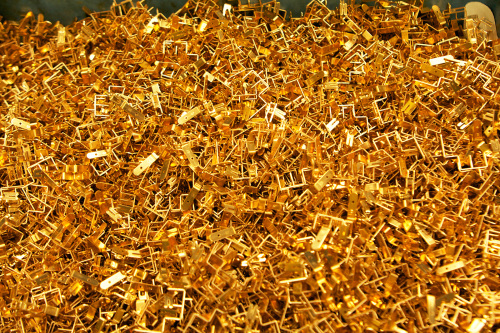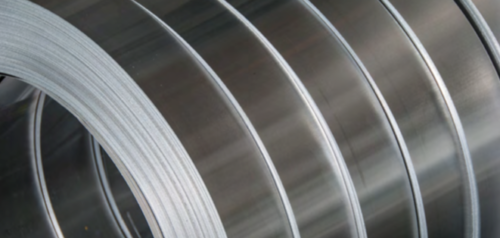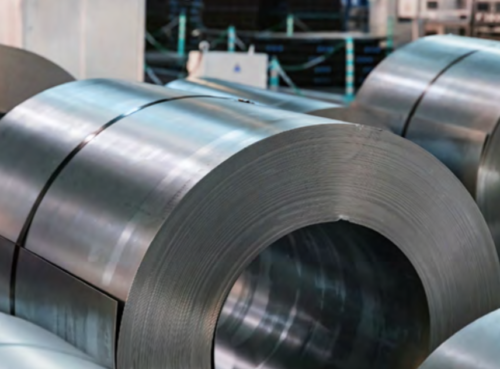As the demand for metal parts, components, and products continues to grow, so does the need for high-speed, reliable manufacturing methods that can produce replicas of complex metal designs. Due to this demand, metal stamping has become one of the most versatile and popular manufacturing processes in the world today.
Developments in metal stamping capabilities and automated technologies have driven significant efficiency improvements in the process. It can produce simple, intricate, or complex parts in fast, cost-efficient batches while adhering to stringent design specifications with a high degree of accuracy.
Metal stamping transforms raw metal sheets into finished components with the following processes:
- Bending
- Embossing
- Notching
- Punching
- Stamping
- Tooling
Request a Quote
Which Raw Materials Are Used in Metal Stamping?
While increasingly advanced metal stamping tools can create high-quality parts, it’s just as important to select the appropriate raw materials as it is to choose the right machining process. Each metal and alloy has different characteristics. Depending on the nature and application of the part, it might need either a common alloy or a specialty metal.
Many common alloys are used as precision metal stamping materials across multiples industries, such as:
- Aluminum alloys
- Brass alloys
- Copper alloys
- Nickel alloys
- Steel and stainless steel
It’s important for designers and engineers to know key information about the most common metals and specialty metals available for metal stamping processes to inform the material selection process.
Choosing the Best Raw Material for Metal Stamping
There are a variety of commonly used raw materials in metal stamping. The application itself will typically determine what metals can be stamped. The types of metals used in stamping include:
Copper Alloys
Copper is a pure metal that can be stamped into a variety of parts on its own, but it is also useful for its alloys. Copper alloys include versatile metals such as brass, bronze, nickel silver, and more. This versatility makes copper and its alloys some of the best materials for metal stamping.

General Information
All copper alloys have varying degrees of copper’s most popular properties, such as conductivity, resistance to corrosion, and antibacterial characteristics. Copper alloys are also non-sparking and non-magnetic.
However, copper and copper alloys are often too soft for strength-based or structural support applications. The metals can easily bend, crack, or break—however, this softness also facilitates easy metal forming. Copper alloys can be formed and stamped with little difficulty due to their malleability, and they can be stretched into thinner, finer wires than other metals. Not only is that incredibly important for electronic and electrical applications, it means copper alloys can easily hold complex and intricate designs that accurately replicate the original design.
Key Characteristics
Copper alloys have distinctive characteristics that make them a versatile material for a broad range of industrial, commercial, and consumer applications. Copper and its alloys share these key characteristics:
- Corrosion resistance.Copper and copper alloys don’t corrode. The material forms a thin oxidized layer on the surface that quickly reforms during finishing or forming processes. Certain copper alloys are more resistant to corrosion than others.
- Decorative appeal.Copper alloys are available in a variety of golden and yellow colors. That makes them appealing for architectural accents, consumer goods, and decorative components.
- Ductile metals can easily be hammered or formed into thin wiring. Copper and copper alloys are some of the most ductile metals, which makes them ideal for wiring and metal threading applications.
- Easy to sanitize. Copper’s smooth finish makes it easy to clean and sanitize, especially when combined with its resistance to corrosion. Copper alloys are also antimicrobial, which makes them an ideal material choice for many medical or food-safe applications.
- Electrical conductivity.Copper is commonly known for its low resistance to electricity. While most copper alloys have less electrical conductivity, they can still be valuable in electronics and electrical systems.
- Much like their ductility, copper alloys’ malleability makes the materials easy to work with. The metals can easily be bent or pressed into simple or complex shapes.
- Resistance to environmental damage.Copper retains its shape and characteristics during exposure to UV radiation, cold temperatures, and heat. The metal won’t become brittle or degrade due to common environmental exposure.
- Smooth finish. Copper alloys have a smooth finish that isn’t abrasive or rough. Its edges can easily be smoothed to make it safe for high-contact parts.
- Thermal conductivity.Copper and copper alloys conduct heat with relatively little resistance. Many cooking and food processing materials have a thin copper or copper alloy coating to facilitate even heat distribution.
Steel Alloys
Steel is an alloy made from iron and carbon. It is one of the most commonly used raw materials in metal stamping and comes in several varieties with distinct characteristics.
General Information
Steel is a dense, strong metal that many manufacturers prefer due to its inherent strength and versatility. While steel is already an alloy, the metal can be further combined with other elements or alloys to create unique variations that increase specific physical properties.
While steel is strong, it can be formed with the right metal stamping processes. The metal is treated either before or after the stamping process to increase hardness or imbue the part with corrosion resistance. While stainless steel is a specific alloy that can resist corrosion, other steels need to be galvanized to prevent rust and damage. Designers and engineers also need to carefully weigh the strength-related benefits of steel against the disadvantages of its weight.
Key Characteristics
Steel alloys share these characteristics in varying degrees:
- Choice of available machining processes. Steel parts can be worked using several different manufacturing processes. The list includes forging, machining, stamping, welding, cutting, and more. This flexibility means steel parts can use different methods at different steps of the production process to create sophisticated products.
- Competitive pricing. Steel alloys are cost-efficient choices for metal pieces. Most steel alloys are common, easy to source, and affordable. Even stainless steel, which can be more expensive than other steel alloys, is reasonably priced.
- Steel contains iron, so it tends to be magnetic. Stainless steel is the notable exception to this rule.
- All steel alloys have an inherent degree of strength. The metals are sturdy, especially if they have been treated and hardened during the manufacturing process.
- There are several different steel alloys, and an endless array of unique alloys can be formed to create metals with precise characteristics. Additional finishing steps, such as galvanization and hardening treatments, give the metals an even wider range of applications.
Aluminum Alloys
Aluminum alloys share many properties with copper and steel alloys. However, they also possess their own unique properties and ideal applications.

General Information
Aluminum is a lightweight metal, and its alloys share this characteristic. This lightness makes the metals ideal for structures that need strength without additional load, as well as for applications at remote destinations that require transportation. Aluminum alloys are flexible, malleable, and resistant to corrosion, but these metals are often more expensive than similar steel materials.
Key Characteristics
Aluminum is usually an investment, therefore it’s essential to be familiar with the common material characteristics and how their long-term value can offset the cost. Aluminum alloys share these characteristics:
- Like copper alloys, aluminum metals can conduct both heat and electricity with relatively little resistance or energy loss.
- Aluminum alloys are both corrosion-resistant and resistant to low-temperature damage that can make many other alloys—steel alloys, for example—brittle.
- Aluminum alloys can be stretched, hammered into thin sheets, and stamped into complex designs without breaking.
- High-quality finish. These metals have a shiny surface that requires minimal finishing or maintenance to stay smooth.
Specialty Metals
Specialty metals are a broad category of different materials designed to withstand adverse and extreme environments without corroding, degrading, or becoming brittle. This category includes many titanium- or nickel-based alloys.
General Information
Since these metals are so diverse, they don’t share many specific characteristics like the more common types of metals used in stamping. These metals can be safely used in many aerospace, chemical, energy, marine, and nuclear facilities or equipment that other metals can’t handle. Due to their increased resistance to damage and relative rarity, specialty metals are more expensive. Many specialty metals are so hard they are also difficult to form or weld, which adds extra time or expense to the project.
The specialists at Keats Manufacturing recommends using common alloys for parts that don’t need additional protective characteristics. Using more common metals saves money and reduces total manufacturing time.
However, some designs will require specialty metals for the unique properties. In those circumstances, a supplier, metal manufacturer, or fabricator consultant can recommend the best materials to fit the application, circumstances, and budget of the project.
Key Characteristics
Not all specialty metals share the same characteristics. However, the following properties are common among most specialty metals used in demanding applications:
- Corrosion resistance.Most specialty metals can withstand water and corrosion risk factors, even saltwater in marine environments. Some specialty metals can even withstand aggressive chemicals.
- Heat resistance.Most specialty metals can withstand extremely high temperatures, such as those found in jet engines or furnaces.
- Specialty metals are generally strong, durable, and resistant to physical damage.
Metal Stamping and Material Selection with Keats
Keats Manufacturing provides large-scale metal stamping and wire forming services in three separate facilities in Texas, Illinois, and Mexico. We have over 160 machines that operate five days a week, 24 hours a day to fulfill customized orders quickly.
Our equipment includes progressive die punch presses, four-slide and multi-slide machines for faster, larger capacity, and we can handle orders from small prototype runs to large productions. We can also help you with the design process prior to fabrication and metal stamping. Our expert staff has a thorough understanding of precision metal stamping materials and what metals can be stamped in which applications. We will gladly assist you with choosing the right metal for your project.
Contact Keats today to talk to our experts about the best metals for your project.
Looking for more? Download our guidebook, Choosing the Best Raw Materials for Metal Stamping, and take it with you!





